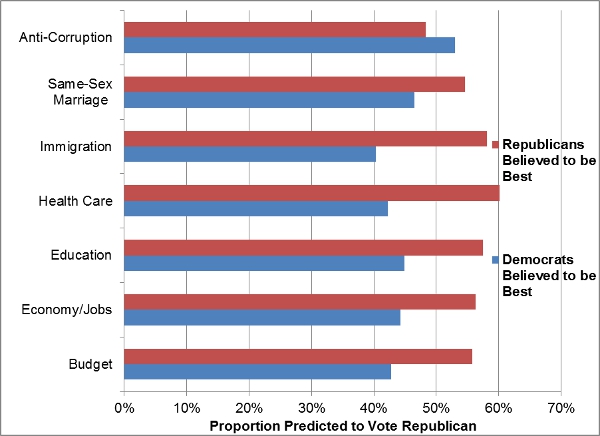
 Political corruption scandals seem to have become commonplace in American politics and the state-level is no exception. But do such scandals hurt the affected party at the ballot box? In new research which examines the effects of corruption scandals in North Carolina, Michael D. Cobb and Andrew J. Taylor find that voters are generally unable to identify the scandalous politician or their party. They argue that corruption scandals do little to affect a party’s vote, and that citizens tend to base their voting choices on other matters.
Political corruption scandals seem to have become commonplace in American politics and the state-level is no exception. But do such scandals hurt the affected party at the ballot box? In new research which examines the effects of corruption scandals in North Carolina, Michael D. Cobb and Andrew J. Taylor find that voters are generally unable to identify the scandalous politician or their party. They argue that corruption scandals do little to affect a party’s vote, and that citizens tend to base their voting choices on other matters.
Political scandals are typically newsworthy events. Some research measures how citizens’ feelings towards democratic institutions are affected when scandals are common. Other studies examine election results to see how scandal-ridden candidates are impacted. Both approaches conclude scandals have material political consequences. First, citizens’ trust in government declines when they are confronted by repeated corruption scandals. Second, scandalous officials are more likely to resign, and those that seek reelection are more frequently defeated, or at least they have a harder time winning reelection, compared to their untainted peers.
Our new research, investigates the answer to a slightly different question. We wondered, do multiple corruption scandals that are attributed to members within only one party generate collective sanctions for fellow partisans? More specifically, are voters more likely to choose candidates of another party because they disapprove of the corrupt acts committed exclusively by members of the opposing party?
This is a particularly interesting question within the American context for several reasons. First, the country’s politics are frequently characterized as candidate-centric. Voters tend to evaluate candidates’ personal attributes and performance rather than the parties they are affiliated with. To find that cumulative individual scandals damage party reputations and cost partisan colleagues votes would be an important contribution. Second, scandals are usually described as influencing elections by encouraging better quality candidates to challenge tainted incumbents. It may be the case, however, that voters choose to punish elected officials’ unethical behavior more directly. We have unique survey data that allow us to analyze this mechanism of accountability. Finally, prior studies are mixed on whether voters “turn a blind eye” to their own party’s misbehavior. Our data permit us to evaluate this thinking and explore voters’ political affiliations mediate their reactions to partisan scandals. We find that while voters say that corruption scandals are important to their vote, their lack of political knowledge often means that scandals actually do little to change voting preferences.
The case we examine provided near-perfect conditions for our inquiry. A number of high-profile corruption scandals involving Democrats had taken place in the years leading up to the 2010 state legislative elections in North Carolina. The list included two governors and the Speaker of of the House in the state legislative assembly. In response, members of the state Republican Party campaigned energetically against the opposition, explaining its candidates belonged to “the party of corruption.” Local media covered Democrats’ corruption scandals in sufficient volume so that voters had ample opportunities to learn about them. All told, the 2010 state legislative election presented North Carolina voters the information necessary to deliberately punish all candidates of one party due to their colleagues’ corruption.
GFK (“Knowledge Networks”) administered a study for us over the Internet to a random sample of 655 adult residents of North Carolina between October 18 and October 30, 2010. We were interested in understanding whether repetitive partisan scandals influence voters’ attitudes and behaviors, so we asked: (1) how favorably a respondent viewed each of the two major state political parties, (2) which state party she felt would do a better job at fighting corruption, (3) how likely she was to vote or if she had already voted, and (4) which party’s candidate she had voted for or was planning to vote for in the upcoming state House election.
The way we estimated the impact of scandals is original. We assumed that scandals directly affect attitudes and behavior only if voters have accurate information about them, so we asked respondents if they could “name a North Carolina politician caught in a recent political scandal.” We recorded the name of the politician and further asked respondents to identify that politician’s partisan affiliation. To get a name correct, but mistake the partisan affiliation wouldn’t allow the voter to administer punishment effectively. Past studies, by way of contrast, ask voters if they think scandals were important to their vote, but that strategy risks overstating their importance due to social desirability biases.
While more than 70 percent of voters tend to say corruption scandals are important to their vote, we find that our respondents’ overall awareness of the scandals falls well short of that benchmark. Less than half of our sample could name both a scandalous politician and the party (Democratic) correctly. Worse, about half of all technically correct answers identified not corruption but rather a sex scandal involving a prominent North Carolina politician on the national scene, former senator and vice-presidential candidate John Edwards. Moral scandals, like Edwards’, should hurt co-partisans much less than those where colleagues are caught up in corruption.
Some of our findings are intuitive. We find, for example, a robust relationship between knowledge of these scandals and participants having a more favorable view of the Republican Party. In addition, those who could correctly identify a corruption scandal also believed Republicans were materially better at “fighting corruption” than Democrats. It is telling, however, that the difference was substantively small and dwarfed by the modal answer, which was that neither would be particularly adept.
These two attitudinal effects, however, are the only ones consistent with the hypothesis that parties are significantly damaged by members’ misbehavior. We discover little, if any, effect of scandal-knowledge on behavior. Even among self-identified Democrats, those who could identify a scandal were more, not less, likely to vote than those who could not; a finding we attribute to scandal-knowledge’s role as an indicator of general interest and activism in politics. Perhaps more worryingly, knowledge of a scandal had no effect at all on the party choice of voters in North Carolina House elections in 2010.
Figure 1 below provides some indication of how little knowledge of corruption scandals influenced vote choice. Respondents were asked which party they thought would do a better job on a battery of issues, including political corruption. In the model, views on all of the issues, with the exception of corruption, have a statistically significant effect on the decision to vote Republican in the state House election.
Figure 1 – Issue and predicted proportion voting Republican

The public might prefer “clean” parties in theory. Its political actions, however, are largely uninfluenced by that preference. Citizens choose candidates based on other matters, such as predetermined and often strong connections to parties and their personal preferences on a wide array of substantive policy issues. The result is that although individual perpetrators of political corruption may be punished by voters, their co-partisans in the legislature have little incentive to police colleagues and prevent corruption from occurring in the first place.
This article is based on the paper, ‘An Absence of Malice: The Limited Utility of Campaigning Against Party Corruption’, in American Politics Research.
Featured image credit: Evert Haasdijk (Flickr, CC-BY-NC-SA-2.0)
Please read our comments policy before commenting.
Note: This article gives the views of the author, and not the position of USAPP – American Politics and Policy, nor the London School of Economics.
Shortened URL for this post: http://bit.ly/1PweMdw
_________________________________
 Michael D. Cobb – North Carolina State University
Michael D. Cobb – North Carolina State University
Michael D. Cobb is an Associate Professor of Political Science in the School of International and Public Affairs (SPIA) at North Carolina State University. His current research interests include studying the antecedents and consequences of misinformation about politics, the effects of public deliberation about science policy, and public opinion about scandals, trade policies, race, and the use of military force abroad.
 Andrew J. Taylor – North Carolina State University
Andrew J. Taylor – North Carolina State University
Andrew J. Taylor is professor of Political Science in the School of Public and International Affairs at NC State University. His research focuses on American governmental institutions.




2 Comments